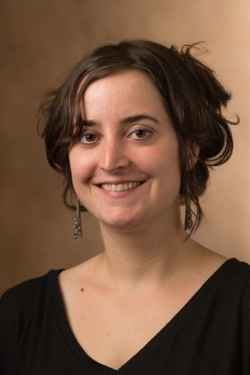Biological Sciences’ DiSalvo searches for unique symbiotic interactions
The Department of Biological Sciences’ newest addition is Susanne DiSalvo, Ph.D., is looking into intimate interactions between amoeba hosts and their bacterial symbionts.

Dr. Suzanne DiSalvo, Biological Sciences
Dr. DiSalvo teaches Bacteriology (BIOL 250) and the Graduate Seminar (BIOL 595) currently for the Department of Biological Sciences.
“I am interested in the mechanisms and consequences of microbial symbioses. Specifically, I study soil amoebae that are naturally infected with a variety of bacterial symbionts… My lab works to describe these unique symbiotic interactions and use them as models to explore the underlying mechanisms of symbiosis and how a variety of genetic and contextual factors influence outcomes.” Says DiSalvo. Further, they isolate and characterize bacteriophages (bacterial viruses) that infect our bacterial symbionts and determine what affect these viruses have on the overall association.
Students can also research with Dr. DiSalvo in her lab to extend their experiences within the department. Dr. DiSalvo’s research interests center on host-microbe interactions that span the symbiotic spectrum (from pathogenic to mutualistic). “My lab aims to elucidate the mechanisms driving host-microbe associations, their phenotypic outcomes on both organisms, and the interplay between genotypes, environmental context, mechanisms, and outcomes.” Adds DiSalvo.
Dr. DiSalvo’s lab primarily focuses on the cellular slime mold Dictyostelium discoideum as a model eukaryotic host for bacterial symbionts. Our main symbionts of interest include bacteria belonging to the plant-beneficial-environmental clade of Burkholderia and obligate unculturable bacterial symbionts from the Amoebophilus and Neochlamydia genera. To explore the interaction between bacteria and their amoeba hosts, they employ a variety of microbiological, molecular, and microscopy techniques.
“I hope that my biology students leave the program with an intensified interest in biology and an appreciation for the role of biological research on our individual lives and society as a whole. Says DiSalvo. “I also want my students to become life-long seekers and critical evaluators of evidence, allowing them to question assumptions and develop strong rationales for their judgments” She adds.
While Dr. DiSalvo is still adjusting to life here at SIUE, she says her time here thus far has been exciting and a wonderful experience. “I love running an independent research program with my cohort of talented undergraduate and MS lab members and enjoy teaching my favorite subjects to great students!” says DiSalvo.
Filed Under: Biological Sciences • Faculty News • Uncategorized












